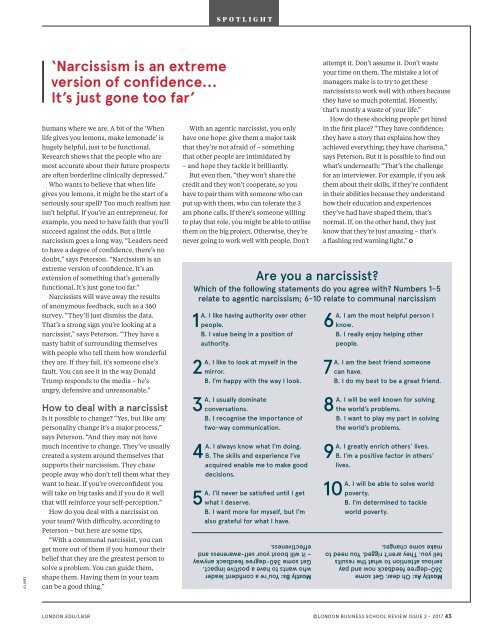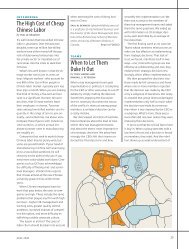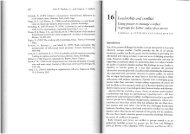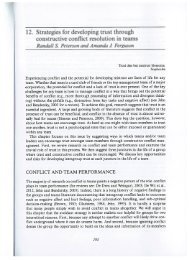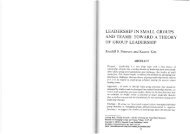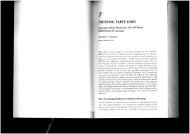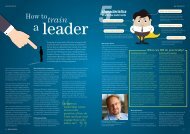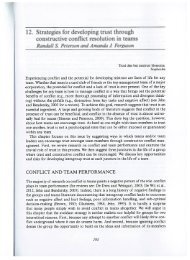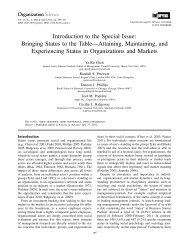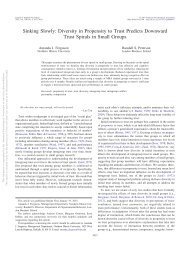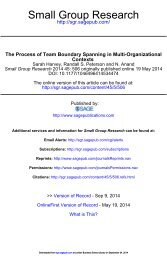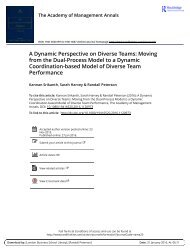When self-confidence is a curse
Not all narcissists need be nightmare colleagues, says Randall S Peterson. Learn to recognise the different types if you want to manage them successfully
Not all narcissists need be nightmare colleagues, says Randall S Peterson.
Learn to recognise the different types if you want to manage them successfully
- No tags were found...
Create successful ePaper yourself
Turn your PDF publications into a flip-book with our unique Google optimized e-Paper software.
SPOTLIGHT<br />
ALAMY<br />
‘Narc<strong>is</strong>s<strong>is</strong>m <strong>is</strong> an extreme<br />
version of <strong>confidence</strong>...<br />
It’s just gone too far’<br />
humans where we are. A bit of the ‘<strong>When</strong><br />
life gives you lemons, make lemonade’ <strong>is</strong><br />
hugely helpful, just to be functional.<br />
Research shows that the people who are<br />
most accurate about their future prospects<br />
are often borderline clinically depressed.”<br />
Who wants to believe that when life<br />
gives you lemons, it might be the start of a<br />
seriously sour spell? Too much real<strong>is</strong>m just<br />
<strong>is</strong>n’t helpful. If you’re an entrepreneur, for<br />
example, you need to have faith that you’ll<br />
succeed against the odds. But a little<br />
narc<strong>is</strong>s<strong>is</strong>m goes a long way. “Leaders need<br />
to have a degree of <strong>confidence</strong>, there’s no<br />
doubt,” says Peterson. “Narc<strong>is</strong>s<strong>is</strong>m <strong>is</strong> an<br />
extreme version of <strong>confidence</strong>. It’s an<br />
extension of something that’s generally<br />
functional. It’s just gone too far.”<br />
Narc<strong>is</strong>s<strong>is</strong>ts will wave away the results<br />
of anonymous feedback, such as a 360<br />
survey. “They’ll just d<strong>is</strong>m<strong>is</strong>s the data.<br />
That’s a strong sign you’re looking at a<br />
narc<strong>is</strong>s<strong>is</strong>t,” says Peterson. “They have a<br />
nasty habit of surrounding themselves<br />
with people who tell them how wonderful<br />
they are. If they fail, it’s someone else’s<br />
fault. You can see it in the way Donald<br />
Trump responds to the media – he’s<br />
angry, defensive and unreasonable.”<br />
How to deal with a narc<strong>is</strong>s<strong>is</strong>t<br />
Is it possible to change? “Yes, but like any<br />
personality change it’s a major process,”<br />
says Peterson. “And they may not have<br />
much incentive to change. They’ve usually<br />
created a system around themselves that<br />
supports their narc<strong>is</strong>s<strong>is</strong>m. They chase<br />
people away who don’t tell them what they<br />
want to hear. If you’re overconfident you<br />
will take on big tasks and if you do it well<br />
that will reinforce your <strong>self</strong>-perception.”<br />
How do you deal with a narc<strong>is</strong>s<strong>is</strong>t on<br />
your team? With difficulty, according to<br />
Peterson – but here are some tips.<br />
“With a communal narc<strong>is</strong>s<strong>is</strong>t, you can<br />
get more out of them if you humour their<br />
belief that they are the greatest person to<br />
solve a problem. You can guide them,<br />
shape them. Having them in your team<br />
can be a good thing.”<br />
With an agentic narc<strong>is</strong>s<strong>is</strong>t, you only<br />
have one hope: give them a major task<br />
that they’re not afraid of – something<br />
that other people are intimidated by<br />
– and hope they tackle it brilliantly.<br />
But even then, “they won’t share the<br />
credit and they won’t cooperate, so you<br />
have to pair them with someone who can<br />
put up with them, who can tolerate the 3<br />
am phone calls. If there’s someone willing<br />
to play that role, you might be able to util<strong>is</strong>e<br />
them on the big project. Otherw<strong>is</strong>e, they’re<br />
never going to work well with people. Don’t<br />
attempt it. Don’t assume it. Don’t waste<br />
your time on them. The m<strong>is</strong>take a lot of<br />
managers make <strong>is</strong> to try to get these<br />
narc<strong>is</strong>s<strong>is</strong>ts to work well with others because<br />
they have so much potential. Honestly,<br />
that’s mostly a waste of your life.”<br />
How do these shocking people get hired<br />
in the first place? “They have <strong>confidence</strong>;<br />
they have a story that explains how they<br />
achieved everything; they have char<strong>is</strong>ma,”<br />
says Peterson. But it <strong>is</strong> possible to find out<br />
what’s underneath: “That’s the challenge<br />
for an interviewer. For example, if you ask<br />
them about their skills, if they’re confident<br />
in their abilities because they understand<br />
how their education and experiences<br />
they’ve had have shaped them, that’s<br />
normal. If, on the other hand, they just<br />
know that they’re just amazing – that’s<br />
a flashing red warning light.”<br />
Are you a narc<strong>is</strong>s<strong>is</strong>t?<br />
Which of the following statements do you agree with? Numbers 1-5<br />
relate to agentic narc<strong>is</strong>s<strong>is</strong>m; 6-10 relate to communal narc<strong>is</strong>s<strong>is</strong>m<br />
1A. I like having authority over other<br />
people.<br />
B. I value being in a position of<br />
authority.<br />
A. I like to look at my<strong>self</strong> in the<br />
2 mirror.<br />
B. I’m happy with the way I look.<br />
A. I usually dominate<br />
3 conversations.<br />
B. I recogn<strong>is</strong>e the importance of<br />
two-way communication.<br />
A. I always know what I’m doing.<br />
4 B. The skills and experience I’ve<br />
acquired enable me to make good<br />
dec<strong>is</strong>ions.<br />
A. I’ll never be sat<strong>is</strong>fied until I get<br />
5 what I deserve.<br />
B. I want more for my<strong>self</strong>, but I’m<br />
also grateful for what I have.<br />
Mostly Bs: You’re a confident leader<br />
who wants to have a positive impact.<br />
Get some 360-degree feedback anyway<br />
– it will boost your <strong>self</strong>-awareness and<br />
effectiveness.<br />
A. I am the most helpful person I<br />
6 know.<br />
B. I really enjoy helping other<br />
people.<br />
A. I am the best friend someone<br />
7 can have.<br />
B. I do my best to be a great friend.<br />
A. I will be well known for solving<br />
8 the world’s problems.<br />
B. I want to play my part in solving<br />
the world’s problems.<br />
A. I greatly enrich others’ lives.<br />
9 B. I’m a positive factor in others’<br />
lives.<br />
A. I will be able to solve world<br />
10 poverty.<br />
B. I’m determined to tackle<br />
world poverty.<br />
Mostly As: Oh dear. Get some<br />
360-degree feedback now and pay<br />
serious attention to what the results<br />
tell you. They aren’t rigged. You need to<br />
make some changes.<br />
LONDON.EDU/LBSR ©LONDON BUSINESS SCHOOL REVIEW ISSUE 2 - 2017 43<br />
LBSR2_p40-43 Confidence CurseNM.indd 43 12/04/2017 10:12


